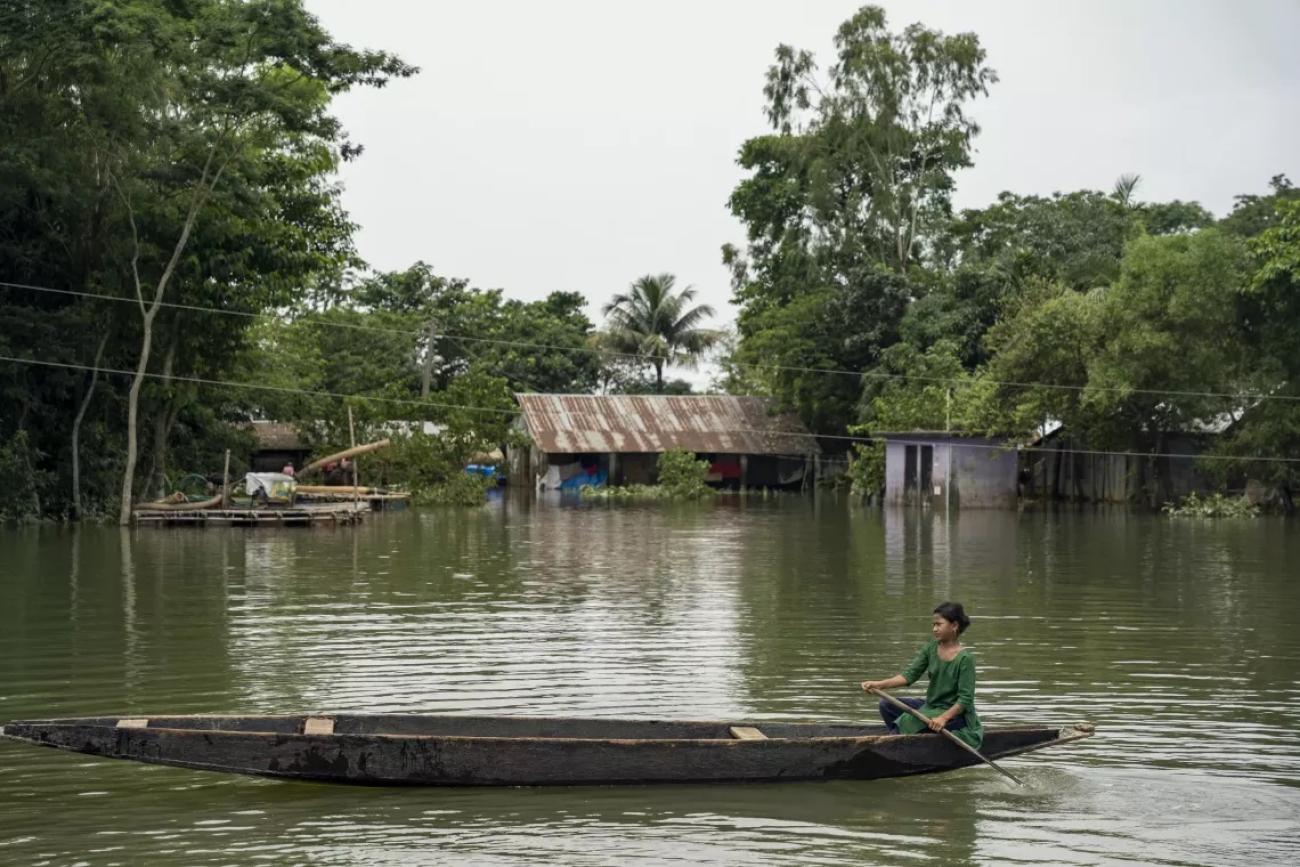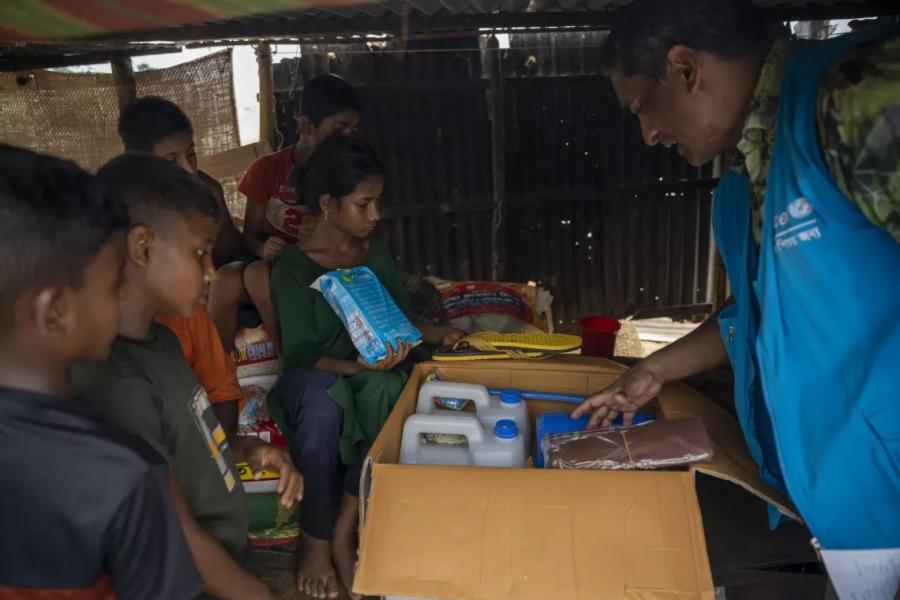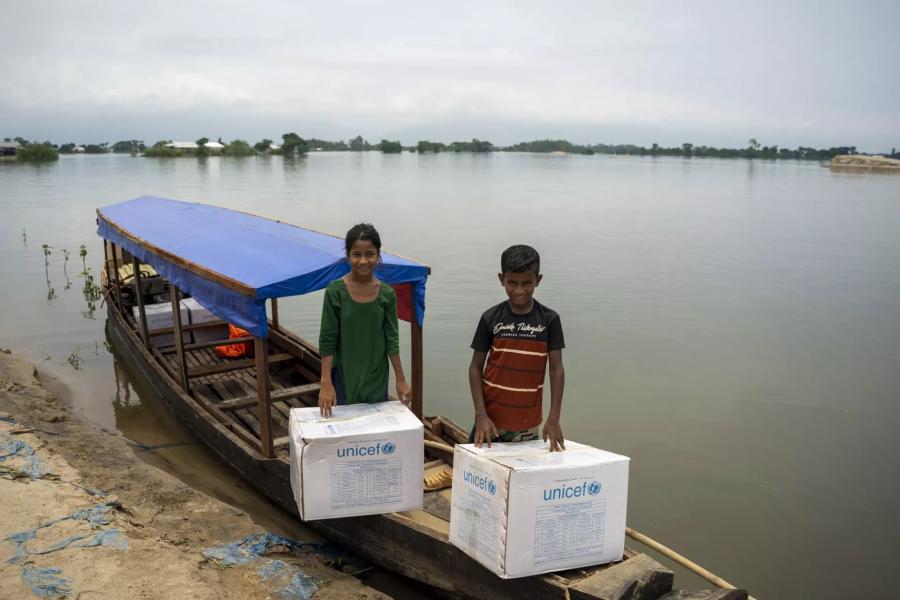UNICEF provides relief and rehabilitation efforts as devastating floods hit 2 million children and families in north-eastern Bangladesh

On Eid night, Ruksana and Rahul navigate dark water to find shelter
26 June 2024 Sylhet, BANGLADESH – “The water is really good,” say both 9-year-old Ruksana and her friend, 12-year-old Rahul. Ruksana is shy and soft-spoken, while Rahul can hardly contain his broad smile. After waiting for half an hour, they finally get to try the water treated by the purification tablets procured by UNICEF in coordination with the Government of Bangladesh.
“During floods, people can easily become sick with different types of waterborne diseases,” explains Shamim Uddin, supporting UNICEF response to the floods, to the villagers surrounding him. “These tablets can disinfect the water1 you drink and help you and your children stay healthy and safe.”
It has been almost a week since floods reached their village in northeastern Bangladesh on Eid night, and this is the first time Ruksana and Rahul drink safe water. Since the floods started at the beginning of June, UNICEF already distributed water purification tablets to cover drinking water treatment for 230,000 people.2 UNICEF is working to further support the Government of Bangladesh to protect children’s health and well-being, procuring additional emergency supplies and providing on-the-ground mental health and psychosocial support to children.
Unfortunately, this is only the beginning of the monsoon season, and the situation is expected to worsen in the coming months.
Three summers of floodwater
At only nine years old, Ruksana has lived and breathed furious floodwaters three years in a row. She could swim, but when finding herself in cold, muddy water during the middle of sleep on Eid night, her first instinct was to scream.
“Please help me!” shouted Ruksana.
Just like for Ruksana, searing memories of that night stay with her mother, Rasheda: her daughter’s cries, floodwater invading the house, pulling Ruksana up with all her strength, and paddling through the darkness to find shelter.
“I was really scared when we crossed the water at night,” recounts Ruksana. “I left behind my Bengali storybooks, my clothes, my shoes.”
It was Eid, a day of celebration and joy, and Ruksana was awaiting new clothes and delicious foods. She didn’t expect that flash floods would strike, inundating most of Sylhet, including her school. And she had no idea that in the next days, nearly 2 million people in northeastern Bangladesh,3 including her family, would be left stranded with little food and drinking water.
“The climate crisis has made the floodwater and rainfalls even more unpredictable and severe,” observes Kazi Dil Afroza Islam, UNICEF Chief of the Field Office in Sylhet. “Flooding has damaged thousands of tube wells and latrines. Most of the well platforms and latrines UNICEF supported the Government to build in 2022 are now under water.”
Crowded makeshift tents, a baby goat, and a football ball
By the time dawn broke, many other families like Ruksana’s had gathered on an elevated sand pile – an unplanned shelter – with cattle and any belongings they could save. A baby goat died, and Ruksana wondered if it was because of the heavy rains.
Ruksana was relieved to see many friends from her village, including 12-year-old Rahul. His family, too, has lost everything. Like other children, Ruksana and Rahul help their parents set up tents, feed cattle and take care of younger siblings. Most days, they eat dry foods like puffed rice and betel leaves.
“I miss school. I miss homework. I miss running on the hill and playing football,” says Rahul, pointing to the floodwater that has now blanketed the hill. “But I lost my shoes and my football ball during the flood.”
Rahul’s bright eyes slightly cast down when recounting how the water rose from his knees to his chest during Eid night. His feet, which used to carry him during football matches, are now covered in red medicine. Noticing their son scratching non-stop during sleep, his parents put the little leftover medicine they had left on him. When opening the UNICEF hygiene kits, Rahul was overjoyed to find a pair of sandals he could use to protect his feet.

Harmonium music on a stranded island
Cramped tents and humid heat, yet life goes on after the disaster. During free time, Ruksana would squeeze wet sands to build castles or paddle wooden boats, and Rahul catches fishes when the water level becomes low. And when Ruksana’s father, Madhu, takes out his precious harmonium to play music for the whole village, they all surround him and listen attentively. Under the tin roof, the rich and warm melodies bring them hope, joy and laughter.
“When I grow up, I want to become a doctor to rescue flood victims,” whispers Ruksana.
“And for me, I want to become a police officer,” adds Rahul.
Despite watching floodwaters swallowing everything, Ruksana and Rahul hold onto hope and dreams of a better future.

UNICEF is urgently seeking additional funds for the emergency response and rehabilitation efforts to provide life-saving supplies and services to children and families.
_________________________
1 UNICEF recommends putting a tablet into 10 liters of water that at least looks clear to ensure that the water is safe to drink.
2 This is calculated on the basis of providing emergency safe water (5 liters per person per day) for a period of 10 days.
3 The Ministry of Public Administration of Bangladesh












